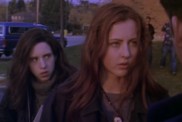
I like to think I have a normal sense of humor, but when it comes to movies my opinion on comedy changes dramatically. While I laugh at many of today’s comedies my opinion of them is minor. To make us laugh is one thing, but to truly be funny and to make us laugh over and over again is another. Comedies that depend on people getting hit in the crotch with stray objects or the appearance of a penis do very little for me. Even if I laugh once there is no way to laugh at those same situations again making the movie a one-time indulgence. Films like this have their place in the zeitgeist, but when it comes to purchasing movies for home viewing what good is a one-time laugh? It’s definitely not worth your hard-earned dollar. I am not saying Jacques Tati’s Play Time is a film all of you should rush out to buy, but I am saying it’s a film I think you should consider when confronted with the decision to purchase something like I Love You, Man or Tati’s 1967 comic vision of the modern world.
When it comes to Tati’s films I have seen three of the director’s works, Play Time, Mon Oncle and Monsieur Hulot’s Holiday. Play Time falls in the middle of those three in my opinion with Hulot’s Holiday standing out as my favorite, but Play Time is a strong contender.
Just as the two other films I mentioned, Play Time follows Monsieur Hulot played by Tati himself as he makes his way from one setting to the next, but Hulot, this time, is not the main focus of attention. Instead, modern architecture is the theme as it dictates human behavior from straight lines in the film’s early moments at Orly Airport to a giant business building made of steel and glass. Also, just as in Mon Oncle an attention to gadgetry and machinery is noted, but not to the same extent – thankfully. Instead, the film moves to a classic scene of comparative domestic dwellings to the fantastic second half set in a chic nightclub restaurant where anything that could go wrong does. The patrons love it, the restaurant is ruined and Hulot experiences all of it, occasionally causing the havoc and at other times becoming a victim of it.
The first half of the film didn’t particularly impress me, while the almost entirely silent transitional segment catches the attention before the impressive finale as we watch from the street two separate households via their massive picture windows, one room often unknowingly playing off the goings-on in the other. It’s a bit off-setting compared to the first half that seemed too much like a Mon Oncle regurgitation to me, but the film is absolutely saved by the restaurant sequence that took seven weeks to shoot, used several actors (had to have been at least 100 minimum) and turns into absolute chaos, but it’s controlled chaos to the point you can look closely and see there is something specific going on in damn near every corner of the frame. It is at once hilarious and at the same time equally brilliant.
Criterion’s Blu-ray release of Play Time is simply a high-definition upgrade of their 2006 DVD release. The release contains a gorgeous video transfer that also improves as the film goes on where we slowly get out of the clear glass and metallic grays and ultimately take advantage of neon signs and nighttime lighting. I have not seen Criterion’s DVD release, but I have read this is a massive improvement. I’ll take those reviews at their word since it looks great.
The supplemental material includes a wealth of Tati-based featurettes, focusing on the filmmaker’s career and the effect the three years it took him to make Play Time had on his career. Suffice to say, the film that cost 15.4 million Euros resulted in Tati’s bankruptcy and caused him to lose almost everything, his family’s home and even the rights to his films (rights he did regain). Was it worth it? It’s hard to say. What separates the filmmaker from the artist? The simple answer is money, but it’s hard to imagine a filmmaker of Tati’s status taking such a risk now. Francis Ford Coppola comes to mind, but even he had to abandon his one-time mega-feature Megalopolis, but his dedication to small personal films is certainly worthy of applause.
An audio commentary from film historian Phillip Kemp runs 47 minutes and covers selected scenes of the film’s 124-minute run-time. Kemp’s comments are well received, brief and informative. He covers ground the additional supplements are unable to really elaborate on, but there are a select few to pay attention to.
Au-dela de “Play Time” is a great behind-the-scenes look that adds a lot to what you have already heard from Kemp. Where Kemp lays the groundwork this seven minute featurette gives you the impressive visuals all the way up to Tati launching a copy of the Play Time script at a falling facade as they destroy his set. Beyond this, Cours du soir is a mildly comical short film starring Tati as the instructor of a class studying the art of mime. This is first touched upon in the 21-minute Tati doc Tati Story, which is far more impressive than the 1987 BBC Omnibus program “Jacques Tati in M. Hulot’s Work” which didn’t impress me much at all.
Overall, this is a hard one to figure out just who should rush out to buy it. If you have seen one of Tati’s Hulot comedies then you probably already know your decision based on what I have already said, but attempting to compare it to any of today’s films for the sake of suggestions is impossible. Movies like this aren’t made any longer. As over the top as some of the moments in a Tati film may seem, they can’t be compared to modern day slapstick. This film dwells in satire with a subtlety that makes the moments you catch on repeated viewings all the more entertaining. Play Time is a film I will undoubtedly watch again and I hope many of you find the same enjoyment in it as I did.










